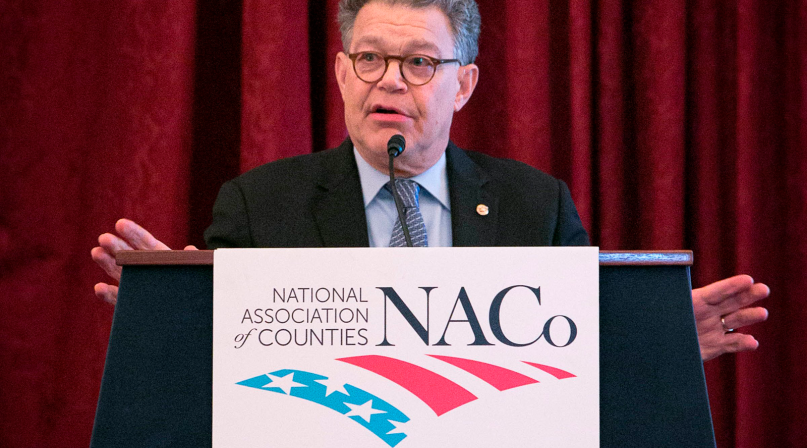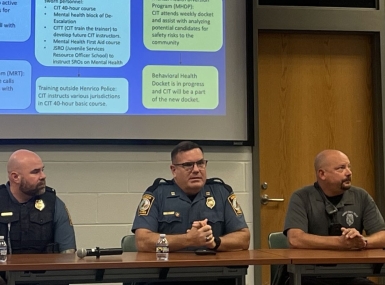County leaders take criminal justice reform plans to Capitol Hill

Sen. Al Franken (D-Minn.) makes the case for keeping mentally ill individuals out of jail at Capitol Hill briefing. Photo by David HathcoxRedirecting resources to human services to meet needs of mentally ill and addicted inmates makes communities safer
County leaders balanced compassion for offenders suffering from addiction and mental health disorders with tough talk on accountability at a Capitol Hill briefing on criminal justice reform Feb. 22.
NACo members described steps their counties were taking to address underlying causes of criminal behavior and ways to treat them and voiced support for the Comprehensive Justice and Mental Health Act.
Shelby County, Tenn. Mayor Mark Luttrell, who previously served as his county’s sheriff, summed up members’ views and pointed out that counties have the largest financial stake in criminal justice reform because of all the steps in the process that county services touch.
“There are people who need to be in prison, but we also know there are people in prison who could be more effectively handled outside of the perimeter of prison,” he said. “I do not think the objective of the criminal justice reform should be to reduce prison populations. Certainly that should be a byproduct.
“Some people just can’t be reached through programming and rehabilitation,” he admitted.
“Bad people” stoke fears in legislators, Miami-Dade County Commissioner Sally Heyman acknowledged.
“It’s a real fear for elected officials to give an alternative to incarceration, because they immediately thought of the Willie Horton story,” she said. “I can’t think of a beneficial reason to incarcerate people, just for holding them for mere convenience over dealing with the problem that may have led to the infraction to begin with.”
Redirecting resources to human services to meet the needs of mentally ill and addicted inmates, she said, will ultimately make communities safer.
Luttrell underscored the need for preventive measures not only to cut down on crime, but also improve the lives of those affected.
“So many issues we face are systemic issues that take years and years to address,” he said. “If we don’t embrace the chance to fight crime at that origin, we’re missing significant responsibilities. If we only focus on arrest, prosecution and conviction we’re just reaping the harvest.”
Luttrell, who is running for a congressional seat, said the challenge county officials face is being able to continue the momentum they have built in the mess of an election year.
“There’s worry that criminal justice reform will be buried under an election year, but I think we have a unique opportunity this year. There’s bipartisanship around this issue.”
On one hand, he said, providing better, more appropriate services is the right thing to do. On the other hand, “it’s also the cost effective thing to do.”
Some people just can’t be reached through programming and rehabilitation efforts.
Sen. Al Franken (D-Minn.), who sponsored the Comprehensive Justice and Mental Health Act, spoke in support of crisis intervention training for law enforcement as a way to better manage situations involving the mentally ill and expedite diversion to mental health treatment programs, rather than jail.
“It doesn’t make sense for our law enforcement officers who often put their lives at risk when they are called upon to intervene in a mental health crisis,” to continue without special training, he said.
“It doesn’t make sense for courts, which are inundated with cases of people who are affected by mental illness. It doesn’t make sense for people who have mental health conditions who would often benefit more from treatment and intensive supervision than incarceration. It certainly doesn’t make sense for taxpayers who foot the bill for high incarceration costs and overcrowded jails and prisons. And (who) must pay again when untreated mentally ill prisoners are released, often in worse shape than when they are first locked up.”
Fulton County, Ga. Chair man John Eaves agreed, having seen, firsthand, effective crisis intervention teams from Johnson County, Kan. and Salt Lake County, Utah. Johnson County deputies respond to calls with embedded intervention team members and Salt Lake County deputies receive direct training.
“We are looking into which of those two models or a hybrid in terms of how we can work with our law enforcement community and make sure that when a person is arrested, the default option is not putting them into the Fulton County Jail,” Eaves said. “With intentionally, being focused and being deliberate, we can reverse the tide.”
Tarrant County, Texas Judge Glen Whitley argued for programming for first-time offenders, people who “think it’s something stupid.”
“If you put them into the jail system and you leave them there very long, you’re starting them on that downward spiral where you’re labeling them and keeping them from being successful, or you’re turning them into ‘criminal science’ students,” he said.
“This is not an attempt to get bad people out. It’s an attempt to identify those folks who we can truly rehabilitate or who do not belong there in the first place, and hopefully prevent them from entering the cycle that can be very hard to get out of.”
More Legislative Conference coverage
- Legislative Conference packed with insights, innovations and influence
- Steering committees explore new legislative policy
- Speakers assess trends in political climate
- Counties accept challenge to combat rural poverty
- Governors’ Roundtable discussion tackles persistent rural poverty
- Workshop: Keeping Counties Moving: Understanding the Role of Freight Transportation as an Economic Engine
- Legislative Conference Workshop: Counties on the Frontlines: The Escalating Substance Abuse Epidemic
- New group forms for LGBT leaders, allies
Attachments
Related News

New approach transforms youth justice in Pierce County
Since 2000, Pierce County, Wash. has achieved an 88% reduction in youth detention — even as the county’s overall population has grown by approximately 30% over the same period.

Law enforcement, mental health pros collaborate in Virginia county
Henrico County, Va.’s crisis response continuum brings together law enforcement and behavioral health professionals to de-escalate mental health crises and avoid unnecessary incarcerations and hospitalizations.

House T&I Committee passes bipartisan FEMA reform package with major wins for counties
The House Transportation and Infrastructure Committee released the bipartisan Fixing Emergency Management for Americans (FEMA) Act
